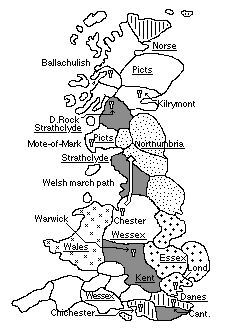 Bretwalda
Bretwalda Bretwalda
Bretwaldaby Mike Demana (article originally appeared in The Herald #32)
East Saxon, South Saxon
As the days lengthened into summer, and warm breezes flowed up from the south, the inhabitants of Britain fancied they could also hear the sounds of warfare in the wind. Most of the clamor came from the South, where Saxon strove against Viking on many a battleground.
The churches of Essex rang loud with another sound -- that of bells pealing the joyful news -- Londinium was their again! After being besieged for half a year of siege, the Danish occupiers had surrendered, and the kingdom had a capital again. As no Vikings were left upon his soil, the king felt secure enough to send his armies against his former allies. Eorl Egbert's army shouldered aside a Wessex army at Warwick and laid siege to the town, which belonged to Kent.
 King Baldred
of Kent had no armies to spare for Warwick's defense, though. His trusted
general Aelfred continued his siege of Canterbury, where the Danes held
the northern part of his realm. In the south, a smaller force sailed from
the Isle of Wight and attacked the Norse who occupied his province of Sussex.
The Norse retreated within the walls of Chichester. Baldred knew his armies
were doing all he could hope for, so he had no choice but to ask again for
help from his more powerful ally, Wessex.
King Baldred
of Kent had no armies to spare for Warwick's defense, though. His trusted
general Aelfred continued his siege of Canterbury, where the Danes held
the northern part of his realm. In the south, a smaller force sailed from
the Isle of Wight and attacked the Norse who occupied his province of Sussex.
The Norse retreated within the walls of Chichester. Baldred knew his armies
were doing all he could hope for, so he had no choice but to ask again for
help from his more powerful ally, Wessex.
Stinging Flies
King Egbert of Wessex remained true, and ordered two armies northwards to Warwick. He had one army already near the town, but it had orders not to engage the Essex invaders. Instead, it withdrew before them and hurried north to Chester, where a Norse fleet had just landed. "Take none prisoner -- slay them all!" were his orders. The king's frustration with the hit and run attacks of the Vikings was becoming evident. Like a great boar, he sought to rend his enemies, but they flitted away like stinging flies, only to settle again after he turned. More frustration loomed when news came that the Vikings had declined battle again, withdrawing northward.
The Viking retreat followed in the footsteps of a mysterious army of Welsh tribesmen. In early Spring, it had burst across Offa's Dyke and marched northwards past Chester. It continued up the spine of England, tramping through Strathclyde's province of Cumbria, and entering Northumbria in summer. No kings admitted knowledge of what the Welsh were doing. They attacked no towns. Did they come as invaders, or as someone's allies?
Swords Bloodied, Spades Muddied
In the north, the Britons of Strathclyde and their Pictish enemies circled each other warily, no time for thought about the Welsh. Both marched and countermarched across each other's paths. Perhaps weary of the slaughter, neither engaged, settling instead upon besieging opposing towns. The Picts encircled Dumbarton Rock, once again laying siege of King Ravenhawk's capital. The British king responded with an invasion of Pictish lands -- laying siege to the town of Kilrymont, as well as sending a force to try to retake Mote-of-Mark. Help unlooked-for arrived for Ravenhawk, when a Danish fleet sailed into the Hebrides and camped before the walls of Pictish Ballachulish. The Pictish king was forced to detach an army from the struggle to try to drive off the Danes.
With nine towns feeling the tightening grip of besieging armies by June's
end, Summer showed signs of only increasing the heat of warfare upon the
island...